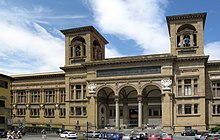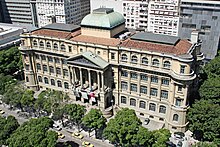
Back مكتبة وطنية Arabic Milli kitabxana Azerbaijani Нацыянальная бібліятэка Byelorussian Национална библиотека Bulgarian জাতীয় গ্রন্থাগার Bengali/Bangla Nacionalna biblioteka BS Biblioteca nacional Catalan Národní knihovna Czech Nationalbibliotek Danish Nationalbibliothek German
This article needs additional citations for verification. (April 2010) |
A national library is a library established by a government as a country's preeminent repository of information.[1] Unlike public libraries, these rarely allow citizens to borrow books. Often, they include numerous rare, valuable, or significant works. A national library is that library which has the duty of collecting and preserving the literature of the nation within and outside the country. Thus, national libraries are those libraries whose community is the nation at large. Examples include the British Library in London, and the Bibliothèque nationale de France in Paris.[2][3]
There are wider definitions of a national library which put less emphasis on the repository character.[2][3]
National libraries are usually notable for their size, compared to those of the other libraries in the same country. Some subnational states that wish to preserve their particular cultures have established comparable libraries with all the attributes of national libraries, such as with legal deposit.
Many national libraries cooperate within the National Libraries Section of the International Federation of Library Associations and Institutions (IFLA) to discuss their common tasks, define and promote common standards and carry out projects helping them to fulfill their duties. National libraries of Europe participate in The European Library. This is a service of The Conference of European National Librarians (CENL).
- ^ Krummel, D. W. “Guides to National Bibliographies: A Review Essay.” Libraries & Culture 24, no. 2 (1989): 217–30.
- ^ a b Line, Maurice B.; Line, J. (2011). "Concluding notes". National libraries, Aslib, pp. 317–318
- ^ a b Lor, P. J.; Sonnekus, E. A. S. (2010). "Guidelines for Legislation for National Library Services" Archived 13 August 2006 at the Wayback Machine, IFLA. Retrieved on 10 January 2010.




